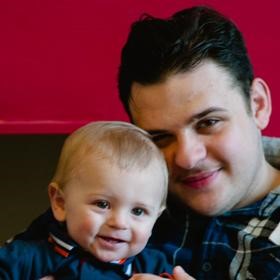Including Fathers
The Early Intervention Foundation presented its latest report, on parental relationships, at its annual conference last month. It focusses on what works to enhance these relationships and why that’s so important for children.
During some of the discussions a health practitioner asked me what we do in Family Nurse Partnership to engage, work with and support fathers. It got me thinking about how we’ve learnt so much about the importance of fathers in the 9 years since Family Nurse Partnership was introduced in England.
There is a strong body of research which tells us that fathers can have a significant impact on the development of their babies both before and after birth. A close father-child relationship and a dad’s involvement in their child’s development and learning can lead to better emotional, cognitive and social development as well as better educational attainment (Goldman, R. 2005).
If the mother has postnatal depression, the father can mitigate against the effects on the child. The earlier in the child’s life the father is involved, the greater the likelihood of such benefits.
Where fathers/partners are more involved and they provide positive support to the mother, her own parenting is more likely to be more positive and less harsh or punitive as well as increasing the mother’s confidence and sense of security. Similarly, low father involvement has been shown to be associated with a range of negative development outcomes for children.
Fathers are an integral part of the Family Nurse Partnership programme
Family nurses are encouraged to engage the father, particularly for the benefit of the child. This may be the biological father and/or step father/father figure. Family nurses develop strong, therapeutic relationships with their clients, including where possible with fathers or partners. The client (the mother) decides whether the father is present for visits, with the nurse recognising that these are often new relationships, and may be quite transient. The programme goals, domains and materials generally apply to fathers as well as mothers and include understanding and developing positive relationships, what this means for their child using both joint and separate activities for each.
The approach to working with fathers is the same as for mothers
Fathers have strengths and potential, and can be supported to achieve change, although engaging young dads often involves additional challenges. They expect to be excluded and be seen negatively by services so the welcome needs to be evident, authentic and encouraging. Young fathers often have additional barriers to engagement such as being excluded by the maternal family, lacking resources and status and may have considerable hidden health issues themselves.
Matching agendas
The family nurses are skilled in matching agendas and balancing the mother’s and father’s needs, communicating in a ‘triad’ rather than ‘dyad’. They support them to explore the effects of parental relationships on a child and work to manage men who may want to dominate the agenda.
Identifying risk
An important responsibility of the family nurse is to judge where a father may be negative/dangerous for the child and/or the mother, identify any risks to the safety of the child and exploring this with the mother. The model and structure of the programme and the relationship built by the nurse aims to be secure enough to focus on difficult issues and take action if needed without clients disengaging from the programme.
Being there when relationships break down
If, during the course of the programme, the couple separate the family nurse uses materials to explore with the client her plans when in a new relationship. These aim to help her think about what she knows about her new partner, his parenting style, and when she will introduce him to her child. These conversations support the client to really think about all aspects of a new relationship and for the nurse to hold in mind that some men seek out women with young children for negative reasons.
Fathers don’t all want the same things
In working successfully with fathers, Family Nurse Partnership recognises that not all fathers want the same things. Involvement in services is not the same as involvement with one’s child, and some fathers want to be more involved than others. There can also be cultural differences to consider. The provider role is important for fathers, and being a Dad can bring a lot of pressure.
Engaging fathers brings benefits for the whole family
Family nurses are remarkably successful in engaging fathers through the Family Nurse Partnership programme in England. A large proportion of fathers we work with are young and often disengaged with services and society. Yet they get involved in the programme and are keen to participate, learn and to be involved in caring for their babies. Fathers and mothers report that they have seen many benefits for their baby and themselves and feel that they are better parents as a result of their involvement with Family Nurse Partnership.
By Ruth Rothman, Head of Clinical Implementation and Learning for the FNP National Unit
References
Pleck, J.H., & Masciadrelli, B.P. (2004). Paternal Involvement by U.S. residential fathers: levels, sources and consequences. In M.E. Lamb (ed.), The Role of the Father in Child Development (4th ed.). Hoboken, NJ: John Wiley & Sons.
Fatherhood Institute Research Summary: Young Fathers: 22 July 2013.
